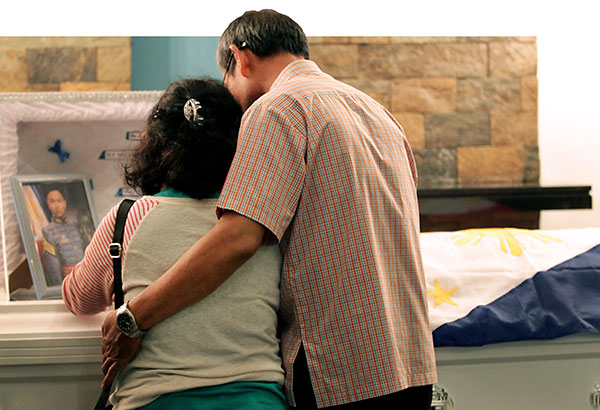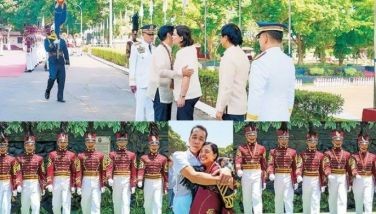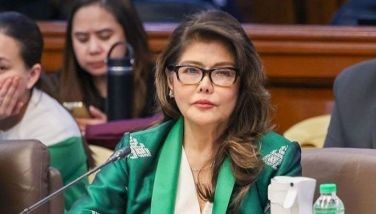Rody scuttles peace talks

Norman and Nelia Alejo grieve at the wake of their son 2nd Lt. Miguel Victor Alejo, who was killed in an encounter with communist rebels in Davao Oriental on Feb.1. President Duterte visited the wake at the St. Peter’s Chapel in Panacan, Davao City the other night.
MANILA, Philippines - A day after lifting the unilateral ceasefire, President Duterte announced last night that he was terminating formal peace negotiations with communist rebels.
In an interview, Duterte said he was ordering the government peace panel to “fold up the tents and come home.”
He issued the statement hours after his spokesman expressed hope for substantial progress in the peace talks despite the lifting of the unilateral ceasefire.
“Peace talks will remain canceled unless there is a compelling reason that will benefit the interest of the nation,” Duterte told journalists during his visit to his parents’ tombs in Davao City.
He had lifted the ceasefire effective yesterday after the New People’s Army killed three soldiers and kidnapped three more in separate incidents in recent days while the NPA’s own truce was supposed to be in place.
Duterte noted that the government had been trying to discuss peace with the rebels since the administration of Fidel Ramos.
“This time is should end here,” he said, reiterating he would not give in to the rebels’ demand for the release of 400 political prisoners.
He denied promising to release the 400, saying doing so would be tantamount to surrender: “We started with 18 and we came up with 23 leaders and now it’s 400. Eh kung ganun mag-surrender na lang kami.”
“I am not interested in arguing with them,” he said, referring to the rebels.
Earlier yesterday, presidential spokesman Ernesto Abella said, “Despite the untenable circumstances on the ground, the peace talks have not yet been scuttled. The road to peace is not an easy journey.”
Duterte had ordered soldiers the other day to “go back to your camp, clean your rifles and be ready to fight.”
He said he had done his best and “walked the extra mile” for peace, but the rebels had acted in bad faith and imposed unreasonable demands.
Abella, however, cited “some progress” during the peace talks between the government and the communist leadership in Rome last week.
He stressed the need to address some concerns, particularly the kidnapping and killing of soldiers in Mindanao.
“Some progress had already been made during the third round of peace talks in Rome, but apparently there is some disconnect between dissident leaders negotiating at the table and their forces on the ground. It would be deeply regrettable that the otherwise positive developments now might have to be set aside,” he said.
On Wednesday, the NPA’s parent organization, the Communist Party of the Philippines (CPP) announced it was ending a five-month-old unilateral ceasefire and accused Duterte of treachery and human rights abuses.
The CPP-NPA also criticized Duterte’s failure to grant amnesty and freedom to nearly 400 so-called political prisoners, after the President released 18 jailed rebel leaders at the start of the talks last year.
The rebels also accused the government of violating the interim ceasefire by allowing the military and paramilitary forces to encroach into their rural strongholds.
Two days later, Duterte announced he would scuttle the government’s unilateral ceasefire with the rebels and ordered the military to resume fighting.
Implications
Presidential Adviser on the Peace Process Jesus Dureza said Duterte made the judgment call in lifting the interim ceasefire with the rebels.
Dureza also said it would be prudent not to jump to conclusions regarding Duterte’s decision.
“The President has spoken. He cancelled the government unilateral ceasefire. He gave his reasons. He makes the judgment call,” Dureza said.
“It’s too early yet to speculate its implications on the peace process. Let’s watch how it rolls out,” he added.
An adviser to the government peace panel however said the withdrawal of the unilateral ceasefire would create uncertainty and fear in areas affected by the decades-long conflict.
Commission on Higher Education commissioner Prospero de Vera, who is among the government advisers in the negotiations with the National Democratic Front (NDF), said the latest development would also make it difficult to convince the public that the peace negotiation is the way forward.
The NDF is the umbrella organization representing the CPP-NPA in the peace talks with the government.
“It is unfortunate that the NPA and the Philippine government have decided to withdraw their unilateral declaration of ceasefire right after the conclusion of the third round of talks in Rome, Italy,” De Vera said.
“This latest development will create uncertainty and fear in many conflict affected communities and make it difficult to convince the public that peace negotiations are the way to go,” he added.
De Vera, who provides the government panel with technical inputs on the forging of the Comprehensive Agreement on Social and Economic Rights, said they would wait for the instructions of President Duterte on how to move forward with the negotiations.
“The lifting of the ceasefire, however, should not detract us from recognizing the gains achieved in the peace negotiations,” De Vera said.
“The cessation of hostilities for close to six months saved hundreds of lives that would have been lost in skirmishes between the government and rebel groups. It also helped generate trust and confidence in the negotiations and helped displaced people in conflict-affected areas to return to their homes and livelihood,” he added.
The government, through the Department of the Interior and Local Government’s Pamana has implemented a program to reconstruct and develop conflict-affected areas, particularly known NPA-infested areas.
De Vera said the three rounds of negotiations also generated a framework and process to fast-track consensus on social, economic and political reforms, and the need to monitor compliance with international agreements.
Government chief peace negotiator Silvestre Bello III earlier said they are expected to sign a bilateral ceasefire agreement and come up with the final peace agreement before yearend.
He said both panels are expected to come back to the negotiating table in Oslo on April 2. –Janvic Mateo, Jose Rodel Clapano, Cet Dematera
- Latest
- Trending



























